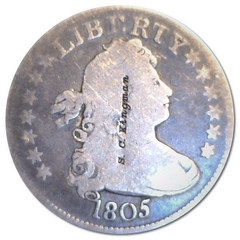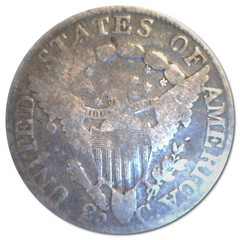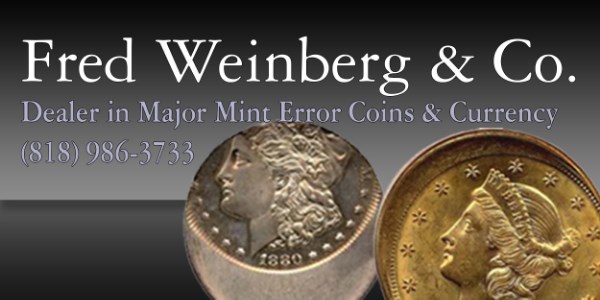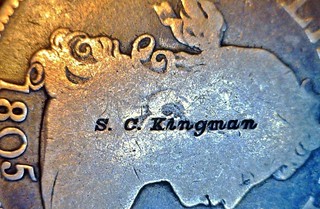
PREV ARTICLE
NEXT ARTICLE
FULL ISSUE
PREV FULL ISSUE
THOSE ENIGMATIC S.C. KINGMAN COUNTERSTAMPSBill Groom shared with us this excerpt of his article on an enigmatic counterstamp soon to be published in Talkin' Tokens, the journal of the National Token Collectors Association. Thanks! -Editor
PUNCHLINES: Those Enigmatic S.C. Kingman Counterstamps
Since Russ Rulau posed that question, twenty-plus years ago, a number of the Kingman counterstamps have surfaced. Many of these stamps appear on rare coins, which added credence to Arvid Johnson's suspicion. Below is shown an as yet unlisted specimen from this writer's collection .... 

The style and positioning of this counterstamp suggested a personal touch; perhaps, that it was applied to some product for which the issuer took pride of ownership. Searching for products that were stamped by an S.C. Kingman, a nineteenth century target rifle was found that was sold by the Amoskeag Auction Co. in 2019 .... There now appears to be a preponderance of circumstantial evidence that Samuel Clayton Kingman was the issuer of the S.C. Kingman counterstamps. Samuel fits the profile suggested by Arvid O. Johnson who speculated that the issuer was a coin collector. While Samuel's coin counterstamp has yet to be precisely matched on one of his firearms or patents, we now know that he applied a similar stamp to target rifle. A great many machinists utilized personal counterstamps for a variety of purposes. As Samuel was a highly skilled machinist, it's quite plausible that he would use a stylized mark such as this, consisting of upper and lower-cased letters, in italics. While the majority of the S.C. Kingman stamps appear on coins dated well prior to 1840, this writer has seen the stamp on an 1855 Flying Eagle Cent, a pattern coin. One of the stamped coins is an 1830 Bust Half in virtually mint condition; coincidentally, the year of Samuel's birth. Considering that Samuel was born in 1830, he'd have been but a teenager at the close of the Hard Times era in 1844. Samuel more than likely created his stamp when he was working as a machinist in the 1850's; this, during the heyday of counterstamp issuance. So, Rulau's having listed this as a Hard Times issue is quite unlikely. Indeed, some of Samuel's coin stampings may even be post Civil War.
For more informstion on the National Token Collectors Association, see:

Wayne Homren, Editor The Numismatic Bibliomania Society is a non-profit organization promoting numismatic literature. See our web site at coinbooks.org. To submit items for publication in The E-Sylum, write to the Editor at this address: whomren@gmail.com To subscribe go to: https://my.binhost.com/lists/listinfo/esylum All Rights Reserved. NBS Home Page Contact the NBS webmaster 
|
